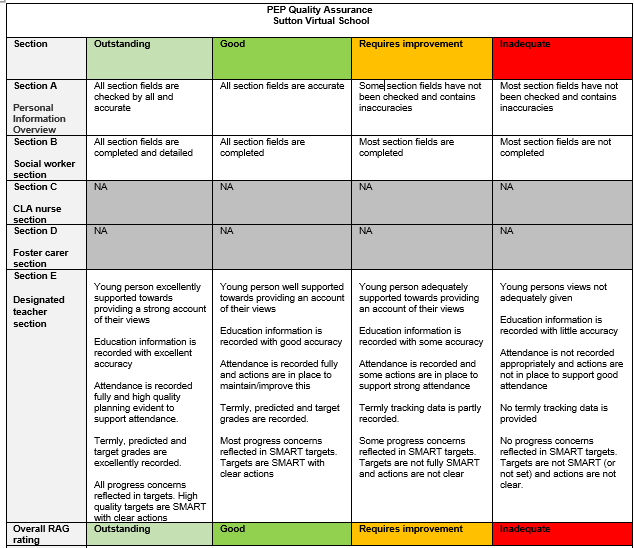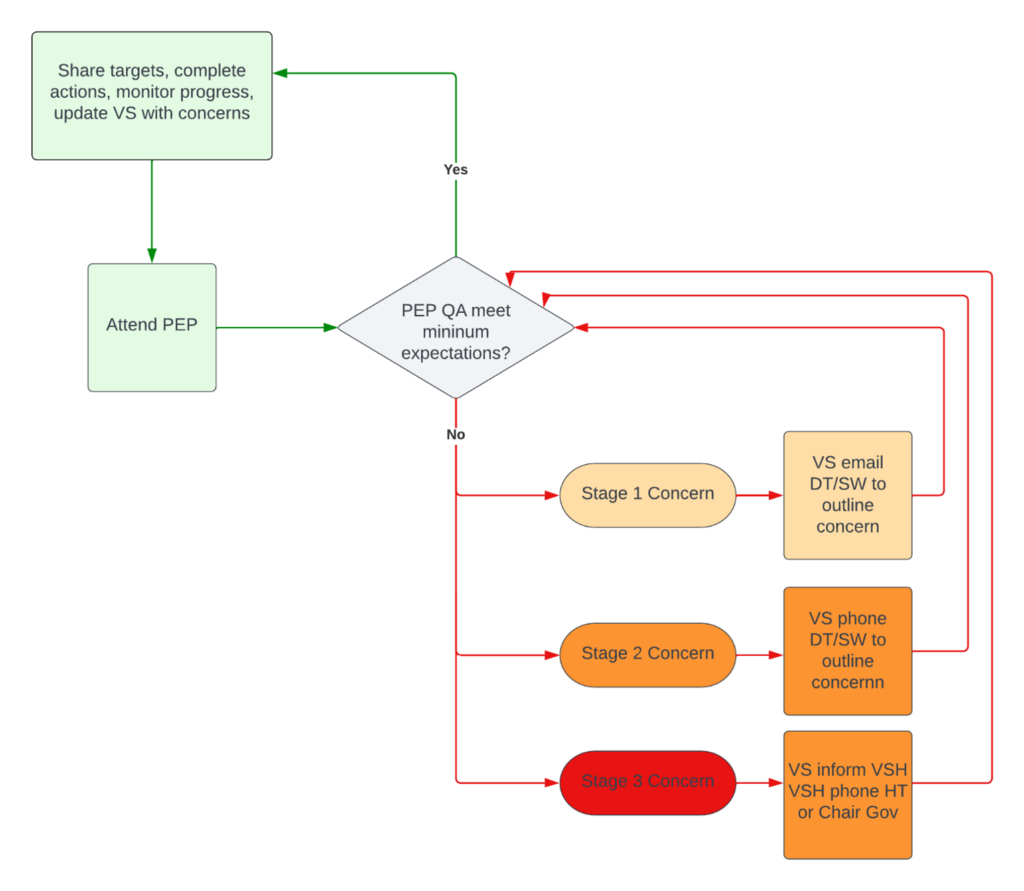1. What is a PEP
All children looked-after (CLA) must have a care plan, of which the Personal Education Plan (PEP) is an integral part. The PEP (pre-school, to age 18) should be initiated as part of the care plan.
A PEP meeting must take place each term for every Child Looked After.
It is an evolving record of what needs to happen for children looked-after to enable them to make at least expected progress and fulfil their potential.
The PEP should reflect the importance of a personalised approach to learning that meets the child’s identified educational needs, raises aspirations and builds life chances.
The school, other professionals and the child’s carers should use the PEP to support achieving those things.
The quality of the PEP is the joint responsibility of the local authority that looks after the child and the school. Social workers, carers, Virtual School Headteachers, designated teachers and, as appropriate, other relevant professionals will need to work closely together to ensure every pep meets the quality assurance criteria.
All of those involved in the PEP process should ensure the child is involved (according to understanding and ability).
Please refer to the PEP section of the statutory guidance for more information.
In Sutton, we use eGOV to record all the information needed for a PEP. eGOV is a web based portal which provides the Virtual School, teachers, social workers and other named professionals access to the child’s current and past PEPs.
2. Social worker ePEP guidance
PEPs are education plans discussed at a meeting, either held in school or virtually.
They are a Statutory part of the care planning for each child and must take place termly.
They are designed to ensure that all important decisions, about the education of Children Looked After are made jointly by the corporate parents; this includes all professionals supporting the young person, including the social worker.
The PEP is an evolving record of what needs to happen for children looked after, to enable them to make at least expected progress and fulfil their potential.
At what age do children have a PEP?
In Sutton, all CLA from pre-school (age 2 if accessing a minimum of 15 hours Early Years entitlement, aged 3 if accessing their 15 hours of provision) to age 18 (until the end of Year 13) are required to have a PEP.
Who should initiate the PEP?
The designated teacher and Virtual School jointly have the duty to ensure the PEP takes place within 20 working days of a child or young person coming into care or changing school.
How often should a PEP be completed?
PEPs need to take place once a term, and a review of the PEP should take place termly or more frequently if there is a need.
If a child is new to care or new to the school, a PEP needs to take place within 20 school days and then be reviewed each term.
A PEP can be done at the same time as EHCP reviews (or similar), if this is convenient.
Quality assurance of the PEP
Sutton Virtual school believe that all of our children looked after deserve a high-quality PEP to support them in achieving to their full potential.
Please refer to our Quality Assurance guidance and use this to support you when writing a PEP.
Sutton VS will regularly monitor PEPs for Quality Assurance using the above framework. This will help inform us where our children are being well supported by a quality PEP, and also identify any areas in need of improvement.
Who should attend a PEP and what are their responsibilities?
- Social Worker: Check section A for accuracy. Completes Section B to update on education, health and care journey and priorities.
- Young Person (if appropriate): Completes Section E young person’s section with the support of the designated teacher.
- Designated Teacher: Checks section A for accuracy. Completes Section E: Young persons section, attendance, suspensions and exclusions, part time timetables and alternative provision, SEND, transition planning, SEMH, attainment levels and progress, designated teacher summary & sign off.
- Carer/ Key Worker: Completes Section D
SMART Target setting
Targets can be: in-school targets, young person led targets or be identified as a result of the discussion.
Targets need to be SMART:
Specific, Significant, Stretching,
Measurable, Meaningful, Motivational,
Agreed, Achievable, Action-Orientation,
Realistic, Relevant, Results-Orientated and
Time-Bound, Tangible, Trackable.
There should be a minimum of one target relating to Pupil Premium Plus. There also needs to be targets linked to literacy (specifically writing in KS1/2), numeracy or at least two academic targets.
Educational transitions
Planning around transitions are key for Children Looked After due to attachment needs. It is important the Designated Teacher takes a proactive role in ensuring any known transitions are well planned for in advance and the young person is well supported into the new setting.
Transitions may include:
– moving to a new Key Stage/class teacher in the same school
– moving to a new Key Stage in a different school/college
– moving to a new school due to a care placement move
– getting ready to leave care either at age 18 or due to end of care status.
Support that may support a young person includes:
– sharing learning information and strategies with new teachers / setting
– building a relationship with new school and inviting them to a PEP meeting to meet the young person and professional network
– ensuring any SEND specific information is handed over to the SENCO
– introducing high aspirations to the young person early and helping them begin to develop career ideas from an early stage
– providing opportunities for Widening Participation visits to university in KS4/5
The PEP meeting
The PEP should be pre-populated in advance of the meeting to ensure that there is adequate time for high quality discussion to take place in the meeting.
Discussions that take part at the PEP meeting are recorded in Section E: Designated Teacher summary, and this section includes things that have gone well, difficulties and concerns, current support in place, impact of PPP, action log and SMART targets.
The PEP should reflect the importance of a personalised approach to learning that meets the child’s identified educational needs, raises aspirations and builds life chances.
The social worker is responsible for
- ensuring they attend all PEP meetings
- ensuring Social Worker section B in the ePEP is completed in advance of the PEP
- ensuring a PDF copy of the PEP is uploaded to Mosaic and shared in the All About Me Review meeting
- ensuring the IRO understands they have access to the ePEP platform and can make comment on any PEP
- inform Sutton Virtual School education advisor with any emerging educational concerns as early as possible
- ensure social worker actions from the PEP meeting are done promptly
- ensuring the ePEP is finalised by Social Worker within 7 days of the PEP meeting.
Using ePEP for the first time
Sutton Virtual School use eGOV an online ePEP system for PEPs. All the educational information and decision making is recorded within ePEP.
Social workers, foster carers and Designated Teachers access the ePEP system via a login. When using the system for the first time, you will need to click the green button to register.
Here are details on how to access ePEP for the first time
If you have any concerns, please call eGOV on 0333 772 0944
PEP Quality Assurance
It is the responsibility of the Social Worker to ensure the PEP is finalised to a high quality within 7 days of the meeting and serves as a useful and accurate documentation of the planning that is taking place to support the young person.
Sutton Virtual School will quality assure every PEP within 14 days of the PEP being signed off.
The Quality Assurance process uses the below criteria for each section of the PEP and the overall grade for the PEP will be decided using a best fit of the scoring across the PEP sections.
We expect all PEPs to meet a minimum standard of Good and we hope that all Designated Teachers will be actively seeking feedback to help PEPs move towards Outstanding. Any PEPs graded less than good, or that are not finalised within 7 days will initiate the PEP concern process.
3. PEP Concern process
In the rare situations where a PEP does not meet minimum expectations, the PEP Concern process is initiated.
The PEP Concern Process, initiated in the following situations:
- A PEP is not finalized by a DT / SW within 7 days
- A PEP does not take place within statutory timescales
- Any other area of concern arises
Download the Social Worker ePEP handbook


